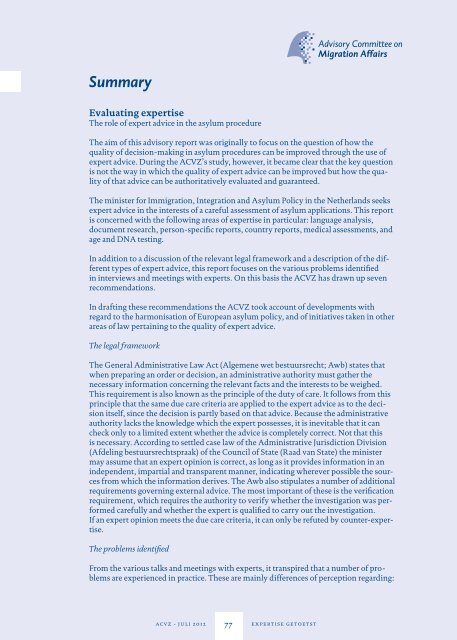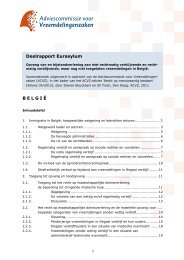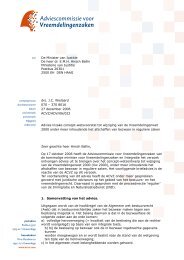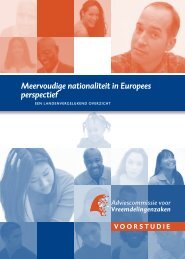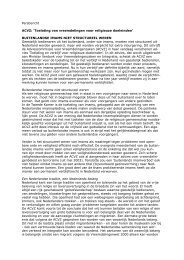advies - ACVZ
advies - ACVZ
advies - ACVZ
You also want an ePaper? Increase the reach of your titles
YUMPU automatically turns print PDFs into web optimized ePapers that Google loves.
Summary<br />
Evaluating expertise<br />
The role of expert advice in the asylum procedure<br />
The aim of this advisory report was originally to focus on the question of how the<br />
quality of decision-making in asylum procedures can be improved through the use of<br />
expert advice. During the <strong>ACVZ</strong>’s study, however, it became clear that the key question<br />
is not the way in which the quality of expert advice can be improved but how the quality<br />
of that advice can be authoritatively evaluated and guaranteed.<br />
The minister for Immigration, Integration and Asylum Policy in the Netherlands seeks<br />
expert advice in the interests of a careful assessment of asylum applications. This report<br />
is concerned with the following areas of expertise in particular: language analysis,<br />
document research, person-specific reports, country reports, medical assessments, and<br />
age and DNA testing.<br />
In addition to a discussion of the relevant legal framework and a description of the different<br />
types of expert advice, this report focuses on the various problems identified<br />
in interviews and meetings with experts. On this basis the <strong>ACVZ</strong> has drawn up seven<br />
recommendations.<br />
In drafting these recommendations the <strong>ACVZ</strong> took account of developments with<br />
regard to the harmonisation of European asylum policy, and of initiatives taken in other<br />
areas of law pertaining to the quality of expert advice.<br />
The legal framework<br />
The General Administrative Law Act (Algemene wet bestuursrecht; Awb) states that<br />
when preparing an order or decision, an administrative authority must gather the<br />
necessary information concerning the relevant facts and the interests to be weighed.<br />
This requirement is also known as the principle of the duty of care. It follows from this<br />
principle that the same due care criteria are applied to the expert advice as to the decision<br />
itself, since the decision is partly based on that advice. Because the administrative<br />
authority lacks the knowledge which the expert possesses, it is inevitable that it can<br />
check only to a limited extent whether the advice is completely correct. Not that this<br />
is necessary. According to settled case law of the Administrative Jurisdiction Division<br />
(Afdeling bestuursrechtspraak) of the Council of State (Raad van State) the minister<br />
may assume that an expert opinion is correct, as long as it provides information in an<br />
independent, impartial and transparent manner, indicating wherever possible the sources<br />
from which the information derives. The Awb also stipulates a number of additional<br />
requirements governing external advice. The most important of these is the verification<br />
requirement, which requires the authority to verify whether the investigation was performed<br />
carefully and whether the expert is qualified to carry out the investigation.<br />
If an expert opinion meets the due care criteria, it can only be refuted by counter-expertise.<br />
The problems identified<br />
From the various talks and meetings with experts, it transpired that a number of problems<br />
are experienced in practice. These are mainly differences of perception regarding:<br />
ac v z - juli 201 2 77 expert ise getoetst


